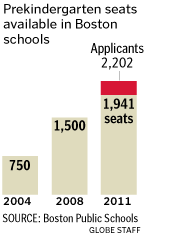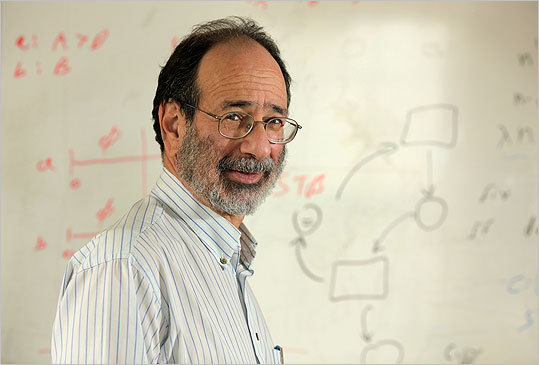Paul Kominers points me to this item:
New ‘JD Match’ to Help Law Firms Find Law Students to Interview; K&L Gates Giving Service a Tryout
"Tired of the traditional on-campus law school interviewing process? A consultant may have the answer for some who would like to deal more directly with law firms and other legal employers seeking law students who want to apply for work.
And here's a longer article from the Am Law Daily, which suggests that unraveling is the motivator, and a deferred acceptance algorithm is part of the proposed solution:
JD Match Aims to Fix the Law Firm Recruiting Process
"On Monday, Ashby Jones at The Wall Street Journal's Law Blog lifted the curtain on JD Match, a new product that will try to connect job-seeking law students with firms. For a $99 fee, students upload their resume and basic information to JD Match, then rank the law firms where they’d like to work. The law firms, in turn, rank students. An algorithm matches firms and students based on their rankings.
"It seems like such a nifty, logical concept that we at The Am Law Daily are kicking ourselves for not thinking of it first. We reached out to the driver behind JD Match, law firm consultant and Adam Smith, Esq. blogger Bruce MacEwen, to find out more. Following is an edited transcript of our phone conversation on Tuesday.
What was the genesis of JD Match?
"People have been kicking around the idea about doing something about the dysfunctional law firm recruiting model for a long time. [Harvard Law School professor]
Ashish Nanda wrote a piece in The American Lawyer last January addressing this very thing.... And from my perspective, the great train wreck of the 2008/2009 recession really revealed the flaws in the system.
There's this arms race to interview earlier and earlier. It's not a smoothly functioning market at all. The economist in me just found that infuriating. So my partner Janet Stanton and I started talking about doing something like this, probably shortly after Ashish's article came out.
We did an extensive amount of research with managing partners at firms, hiring partners, career services people at law schools, and even students and junior associates, and quickly realized that the medical matching model which Ashish had written about was not going to work in our world. To begin with you can't make anything mandatory with law firms. Nevertheless, we were inspired by the idea of having an algorithm at the heart of the process.
How will the algorithm work?
"The algorithm will run three times in the OCI recruiting season: August, September, and October. What it does is assume the Econ 101 truth that each firm and each student is in the best position to determine what's in their self-interest. So the only input to the algorithm is preferences for firms for students and preferences for students for firms. That's it. No qualitative or quantitative information whatsoever.
"The assumption is that the preferences represent all the distilled information--research, anecdotes, gossip, whatever--that firms have about students and students have about firms. When the algorithm runs, a couple of things happen. First, no student and firm wlll ever be paired unless it's mutual. So if I didn't put Skadden on my list, it doesn't matter if Skadden loves me. I'm not going to be matched with Skadden.
So give me a hypothetical scenario of how this would work.
"Let's pretend I did put Skadden as my first choice and they did have 25 spots. I will tentatively, as the algorithm is running, be matched with Skadden unless and until I get bumped because Skadden gets matched with 25 students it likes more than it likes me. And then I go to my next available firm that has a seat for me. And then it goes on like that.
"Students get [matched with] one and only one firm on the theory that they can only take one job. Firms will get as many students as they said they have slots or maybe fewer if not that many students like them. But they won't get more. So this helps firms manage yield. And two professors of law [Kevin Quinn at the University of California at Berkeley and Andrew Martin at Washington University in St. Louis] are writing the algorithm for us.
Why will you run the algorithm three times?
"Let's pretend that I'm a law student back at Stanford but I have delusions about what a hot commodity I am. Let's say the first 15 firms I rank are highly aspirational: Skadden, Davis Polk, Cleary. You know. The usual suspects. So the August match runs, and I find out that I was matched with firm number 17. Well, this is a reality check for me. It's unfiltered, real-time market information and that should tell me for the September match and OCI, I need to be a little more realistic.
Is there a baseline number of students and firms that JD Match will need to sign up in order for the process to work efficiently?
"Yes. We have four Am Law 30 firms signed up including K&L Gates. We can't name the other three yet, but they will come out shortly. We've been previewing JD Match primarily to the law firms, but we've also reached out to the law schools. The schools are intrigued. They're a little nervous about upsetting the OCI process that they drive, but they do understand JD Match provides an overlay to the process as it currently works. We don't change anything about OCI.
What else do you have in the works?
"We are creating something called the JD Match Institute which we will fund out of our revenues. And its designed to begin to look at the data we will be gathering and suss out what actually makes for successful lawyers.
"Our strong suspicion--confirmed by [University of Indiana professor] Bill Henderson--is it ain't GPA. In version 2.0 of JD Match we will introduce some psychographic and behavioral testing for students. Voluntary, obviously, but there are very few law firms that are doing this. McKenna Long is doing it. Some firms like K&L are doing it in the U.K....
"What we think we can develop in fairly short order is empirical evidence of what makes for a successful lawyer and that would be tremendously exciting for us because law firms could begin to hire a little more rationally. Frankly I think it could only be good for the students. There are 40,000 law students in the U.S. and how many of them are on the Harvard Law Review? But a lot of them could be great with clients, could be responsive, could be team players, could be emotionally intelligent....It could only open up more doors."









